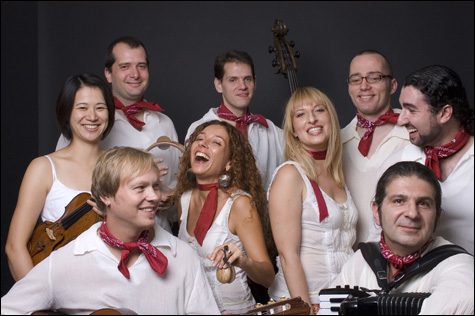
SONGS FROM THE SOUTH Informed but not fussy, Marsico and Rossi (center) take a very pop attitude toward “early music.” |
When in 1999 Björn Wennås moved from Sweden to Boston to study jazz guitar, he hardly imagined that he'd one day be playing in an ensemble that specializes in Italian folk music of the 12th to 19th centuries. But then, neither did his wife, the singer Carmen Marsico, who came from Castelfranco Veneto to study jazz singing at Berklee. Or Angela Rossi, from Milan, another Berklee jazz singer. But now they're all part of Newpoli, a nonet who've been rising in popularity since the release of their homonymous debut last year. They play the Regattabar this Wednesday, with a line-up that includes a top-shelf sampling of local jazz players.
Marsico and Rossi started Newpoli in 2003, more or less out of pique. Berklee had announced its annual student international folk festival, and when they looked at the list of applicants, the two women saw no Italian music. They quickly gathered some fellow students to learn Southern Italian songs they knew from home. "We're from families of immigrants," Marsico explains when I get together with her and Rossi over tea in Inman Square. "Our families are from the South." They remind me that Italy as a unified nation didn't exist until the beginning of the 19th century. Rossi's family is from Naples, Marsico's from the Puglia region, on the heel of the boot. "For the Milanese," says Rossi, "Naples is Africa. . . . Everything is slower there, the food is better, the music is better."

Marsico and Rossi made a connection in the short set they played at Berklee and got a good response. "We couldn't just let it die," says Marsico. Other gigs followed, and audiences who didn't know Italian responded. The two women dug further into the history of Italian folk music — its tarantellas, canzones, villanellas, and morescas. At the Lily Pad during one performance, passers-by heard the music, wandered in, and began dancing. Marsico and Rossi have since added their own dances to performances.
When Rossi makes the Africa comments, she adds, "I'm not kidding!" — and she isn't. You can hear driving 6/8 African rhythms, Arabic-tinged percussion, and Middle Eastern minor modes all though Newpoli. In its rich arrangements, the music is colored by violin, acoustic bass, accordion, modern acoustic guitar, and a variety of hand percussion that includes castanets and tambourines. Marsico and Rossi trade agile and earthy lead vocals, sometimes joined for spirited call-and-response from percussionist Fabio Pirozzolo.
The songs themselves vary in affect. There are several varieties of regional tarantella. The opening "Pizzica" is typical Puglia-style, kicking off with Arabic hand drums and then accordion and a descending guitar scale. The first vocal comes in, joined by group-vocal responses, super-fast and frenetic, like one of female a cappella trio Charming Hostess's Balkan breakdowns. "Li 'Ffigliole," meanwhile, is a Renaissance dance, a 16th-century rustic villanella (not to be confused with the French poetic form), with some lovely three-way vocal polyphony on the refrain and a perfectly articulated "early music" violin solo by Megumi Sasaki. The dirge-like minor-key "La Serpe a Carolina" is a parody of the 17th-century Bourbon queen, disguised in Neapolitan dialect and a pretty 3/4 melody, its general tone and breaks for guitar and flute solos suggesting Don Giovanni's sly serenade "Deh, vieni alla finestra."
In just about every case, it's the details that make the difference — ardent vocal delivery, rhythmic articulation, ensemble coloring. On the dirge-like, minor-key " 'E Spingule Francese," Kendall Eddy's bass sways under the percussion to nudge the march rhythm toward a slow dance, and Marenglen Skendo switches from concert flute to his Japanese wood shakuhachi for just the right earth tones. Meanwhile, the humor and exuberance of the vocals on "Tammuriata Nera" and " 'O Guarracino" might recall Mama Corleone's "Luna mezz'o mare," from The Godfather.
Marsico and Rossi have done their homework, so they know the material, but they're not slaves to stylistic correctness. (Both continue to play jazz, Marsico in a group she leads with Wennås.) "There are so many influences in this music anyway," says Rossi. "We want to keep it modern, and international."
Another long-time musical scholar who has no use for stylistic purity is Steven Bernstein, who brings his Millennial Territory Orchestra to George Wein's Newport Jazz Festival on August 9. Bernstein is a charter member of the '80s New York downtown scene that coalesced around the Knitting Factory, working in bands like John Lurie's Lounge Lizards, and later in the collaborative trio Spanish Fly and his quartet Sex Mob. Other projects have included working with everyone from Jim Thirwell of Foetus to director Robert Altman and the Band's Levon Helm.